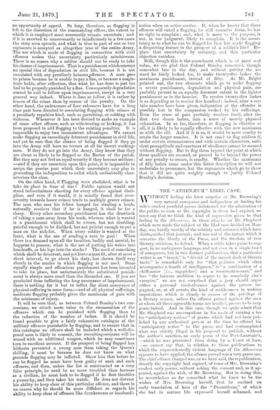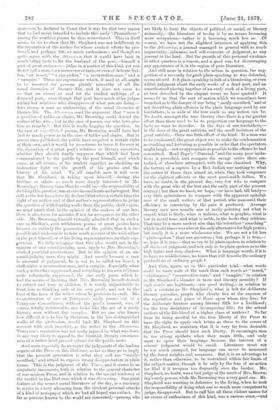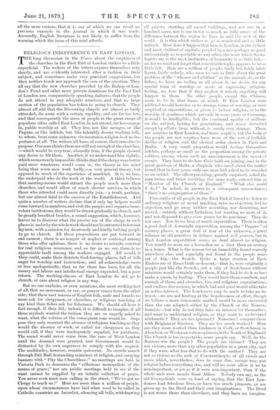THE " ATHENYEUM " LIBEL CASE.
WITHOUT feeling the least surprise at Mr. Browning's very natural annoyance and indignation at finding his wife's crudest youthful poems disinterred for the admiration of the public, so soon as the copyright in them had expired, we must say that we think the kind of expression given to that feeling in the Athenceuni, in those attacks on Mr. Shepherd which were made the subject of the libel case decided on Mon- day, was hardly worthy of the sobriety and reticence which have distinguished that journal ; and was not of the nature which it concerns the liberty of the Press, and the freedom of true literary criticism, to defend. When a critic takes pains to sug- gest, in no ambiguous language, and not even in a single burst of annoyance, but in two distinct publications, that a particular writer is an " insect," is " devoid of the merest dash of literary taste," is remarkable only for " that patience which often accompanies a dearth of intelligence," is a combination of a chiffonnier [i.e., rag-picker] and a resurrection-man," and has " the fatuous ambition to aspire to be somebody else's vampire," we are not surprised that a jury should argue either a personal vindictiveness against the person im- pugned, or, at all events, the kind of recklessness iu making imputations which is clearly in excess of the privilege of a literary censor, unless the offence proved against the man at whom all these agreeable terms are levelled, proves to be very grave indeed. And in this case, though we quite admit that Mr. Shepherd was unscrupulous in his mode of earning a fee for "anticipatory notices" of poems which had not been pub- lished by any authorised person at the time he offered his " anticipatory notice " to the press, and had contemplated what was strictly illegal in his proposal to publish, without the author's sanction, an early poem of the Poet-Laureate's, —which he was prevented from doing by a Court of Law, —we cannot say that, in relation to those publications to which the unprecedentedly violent language of the Athenccum appears to have applied, the offence proved was a very grave one. The chief offence charged was, as we have said, the republication, directly the copyright had expired, of some of Mrs. Browning's crudest early poems, without asking the consent and, as it ap- peared, against the wish, of Mr. Browning. But in doing this, he nevertheless so far consulted what he knew to be the wishes of Mrs. Browning herself, that he omitted an early translation of hers of the " Prometheus," of which she had in mature life expressed herself ashamed, and
moreover, he declared in Court that it was for that very reason that he had never intended to include this early "Prometheus " among the youthful poems he thus resuscitated. This in itself seems to us to show that Mr. Shepherd was not indifferent to the reputation of the author for whose crudest efforts he pro- fessed, and perhaps felt, so much enthusiasm ; and though we quite agree with the Atheneum, that it would have been in much better taste to let the husband of the poet,—himself a poet of great eminence,—judge in a matter of this kind, yet you do not call a man, for a mere error of taste, or even of delicate feel- ing, " an insect," " a rag-picker," " a resurrection-man," and a " vampire." These are expressions which, if used at all, ought to be reserved for persons plainly unworthy of all the usual decencies of literary life, and it does not seem to us that an excess of zeal for the crudest writings of a deceased poet,—even though that poet have much abler judges among her relatives who disapprove of what you are doing,— does stamp a man as undeserving of the usual decencies of literary life. The Atheneum used the argument that " were it a question of tables or chairs, Mr. Browning could defend the wishes of his wife ; but in the case of poems, our wise laws give him no remedy." But this is really begging the question. In the case of ?, iipltbliAcd poems, Mr. Browning would have had just as much power as in the case of tables and chairs. But in poems once published, the public have acquired a certain right of their own, and it would be monstrous to leave it for ever at the discretion of a great poet's relatives or literary executors, whether they should finally suppress that which had been communicated to the public by the poet himself, and which some, at all events, of his readers regarded as shedding an instructive light on the growth of his genius and the history of his mind. To all sensible men it will seem that Mr. Shepherd, in taking upon himself,—during the lifetime of others so much more deeply interested in Mr. Browning's literary fame than he could be,—the responsibility of deciding this question, was at once inconsiderate and arrogant. But still, as the law has advisedly declared that after a certain time the right of an author and of that author's representatives to judge the question of withdrawing works from the public, shall expire, we must admit that, in the opinion of the makers of our law, there is also room for mistake, if not for arrogance, on the other side. Mr. Browning himself virtually admitted that in such a case as Shelley's, even withdrawn poems of great genius have become so entirely the possession of the public, that it is im- possible and undesirable to take much account of the wish either of the poet himself, or of his living representatives, for their sup- ,pression. We fully recognise that this plea would not, in the opinion of any sound-judging man, apply to Mrs. Browning's crudest youthful productions. But in the opinion of an un- sound-judging man, they might. And merely because a man is unsound of judgment, he is not to be called an insect, a chiffonnier, a resurrection-man, and a vampire. Especially when such a writer has suppressed, and according to his own evidence quite voluntarily suppressed, the one early poem which he had the means of knowing that Mrs. Browning herself desired to retract and bury in oblivion, it is surely unjustifiable to treat him as thinking only of his own profit, and not in the least of the fame of the writer whom he professes to exalt. His reconstruction of one of Tenuyson's early poems out of a Tennyson Concordance, without the poet's consent, was, of course, totally indefensible, and looks like the act of a needy literary- man without fine scruples. But no one who knows how difficult it is to live by literature, in the less distinguished walks of the profession, would load Mr. Shepherd on this account with such invective, as the writer in the Athena:um. Tennyson's reputation was not really injured by what was done, in any way likely to appeal to the bluntish literary conscious- ness of a rather hard pressed caterer for the public taste. are likely to form the objects of political, or social, or literary animosity,—the literature of to-day is by no means becoming more scrupulous,—rather is it becoming much less so. Of course, we have not the slightest intention of applying this to the Atheneum, a journal managed in general with as much impartiality, calmness, and self-restraint of judgment, as any journal iu the land. But the growth of this personal virulence in other quarters is a reason, and a good one, for discouraging any appearance of it in the region of pure literature.
And still more in relation to the action in question, the sug- gestion of a necessity for such plain-speaking as was defended, seems absurd. Is it plain-speaking to talk of a blundering, or even wilful, judgment about the early works of a dead poet, and an unauthorised piecing together of an early work of a living poet, as best described by the elegant terms we have quoted ? It seems to us that the sort of notion which we sometimes hear broached as to the danger of our being " mealy-mouthed," and of not describing plain offences in the plain language used by our forefathers, is as wide of the true mark as any notion can be. No doubt, amongst the true literary class there is a far greater effort than there used to be to proportion our language to the facts we want to describe. In the days of our forefathers,— in the days of the great satirists, and the small imitators of the great satirists,—there was little effort of the kind. If a man was to be condemned, the great object was to make the condemnation as crushing and torturing as possible in order that the spectators might laugh,—not as appropriate as possible to the offence he had committed. Read Pope's " D tmciad," and the many poor imita- tions it provoked, and compare the savage satire there em- bodied, or elsewhere attempted, with the sins chastised. Why, the torture of a captive by a Red Indian was nothing to what the critics of those days aimed at, when they took vengeance for the slightest affronts or the most pardonable follies. We have, no doubt, in the present day, very few wits to compare with the great wits of the last and the early part of the present century ; but then we have, we hope,—or have had, till lately— very little spitefulness to compare with the apparent spiteful- ness of the small writers of that period, who measured their efficiency in censorship by the pain it produced. Average literary men now usually aim at really pointing out what is stupid, what is lively, what is tedious, what is graphic, what is low in moral tone, and what is noble, in the books they criticise. That may be a more modest aim than the relentless "smashing" which in old times was almost the only alternative for high praise; but surely it is a more wholesome aim. We are not a bit less " plain-spoken " than our ancestors ; but perhaps it is true,— we hope it is true,--that we try to be plain-spoken in relation to all shades of judgment, and not only to be plain-spoken as to the high lights and deep shadows. What is language worth, if it is to have no middle-tones, no tones that will describe the ordinary prodnctions of ordinary people ?
And then, again, as to this particular trial,—what words could be more wide of the mark than such words as " insect," chiffonnier," " resurrection-man," and " vampire," in relation to Mr. Shepherd's blunder in taste and literary morality P If such words are legitimate,—are good writing,—in relation to such a mistake as Mr. Shepherd's, what is left for deliberate literary parasites, people who clearly live at the expense of the reputation and peace of those upon whom they live ; for the deliberate hunters among literary filth for a livelihood ; for the true disinterers of decomposing life ; for the actual suckers of the life-blood of a higher class of authors ? So far from its being needful for the true liberty of the Press to have the right to apply such terms as these to the errors of Mr. Shepherd, we maintain that it is very far from desirable that the Press should have such liberty. It encourages men to use strong epithets when they mean little, and only want to spice their language because the interest of a soberer judgment would be small. Literature must not be too much cramped, for language can never be measured by the finest weights and measures. But it is an advantage to it, rather than otherwise, to be restrained within fair limits of the subject-matter, though it be only by the fear of an action for libel if it trespass too flagrantly over the border. Mr. Shepherd, no doubt, was a bad judge of the merit of Mrs. Brown- ing's early poems, while Mr. Browning was a very good one. Mr. Shepherd was wanting in deference to the living, when he took the responsibility of doing what one so much more competent to judge, disapproved. But to call him all these violent names for an excess of enthusiasm of this kind, was a curious error,—and. all the more curious, that it is one of which we can recall no previous example in the journal in which it was made. Assuredly, English literature is not likely to suffer from the warning which the issue of this trial affords.




































 Previous page
Previous page